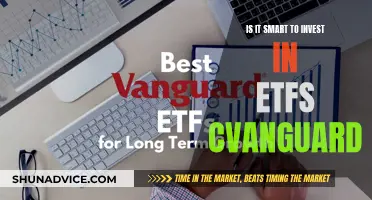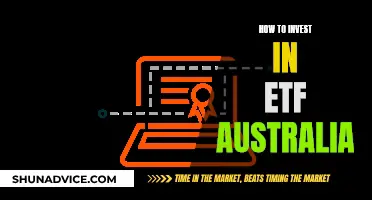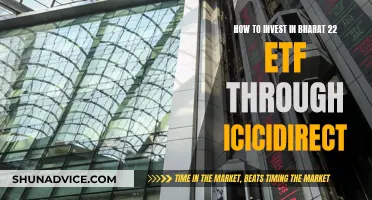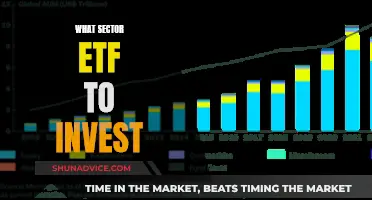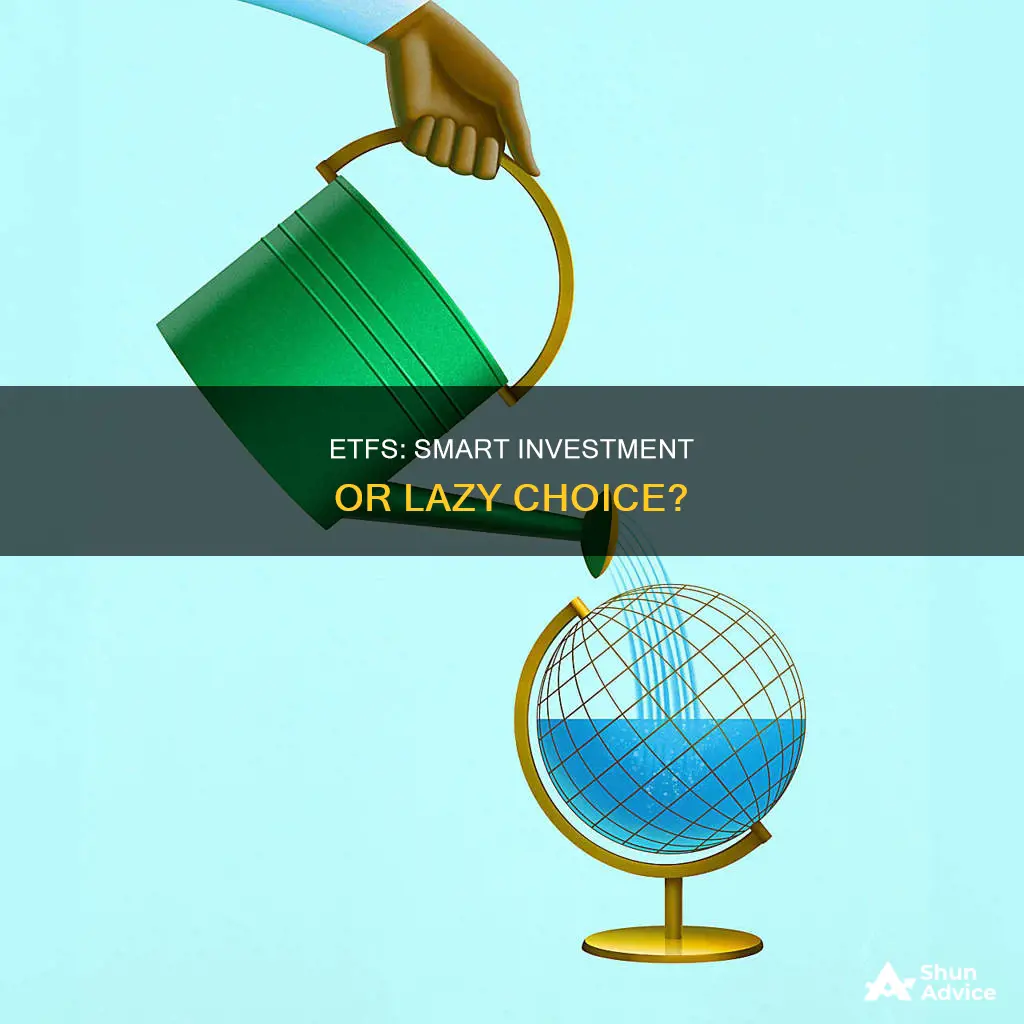
Exchange-traded funds (ETFs) are a popular investment vehicle, particularly for those new to investing, due to their low costs, diversification, and passive management. However, there are some potential drawbacks to consider before investing solely in ETFs.
ETFs are baskets of stocks or other securities, providing instant diversification for investors. They are similar to mutual funds but trade like stocks, allowing investors to buy and sell during market hours. This stock-like nature also means that investors may have to pay a commission every time they buy or sell an ETF, and these trading fees can quickly add up, reducing investment performance.
ETFs are considered low-risk because they are low-cost and hold a variety of stocks or securities. They also tend to have lower expense ratios than actively managed funds and can be more tax-efficient. However, they are not without their unique risks. For example, the potential for large swings in value depends on the scope of the fund, with ETFs tracking a specific industry or sector likely to be more volatile than those tracking a broad market index.
Additionally, while ETFs provide diversification, some may offer limited exposure to certain sectors or foreign stocks, potentially missing out on growth opportunities. They may also have lower dividend yields than owning individual stocks, and investors have less control over the underlying stocks in the ETF, which could be a drawback for those with specific moral or ethical considerations.
In summary, while ETFs offer instant diversification and are a good option for those starting their investment journey or seeking a passive investment strategy, they also come with potential drawbacks, including trading fees, volatility, limited exposure, and reduced control over the underlying investments.
What You'll Learn

ETFs can be more tax-efficient than mutual funds
Exchange-traded funds (ETFs) are often considered more tax-efficient than mutual funds due to their inherent structure and passive management. Here are several reasons why:
Fewer Capital Gains Distributions
ETFs generally don't distribute capital gains to shareholders, whereas mutual funds are required to do so if the fund manager sells securities for a profit. This distribution is made according to the proportion of the holders' investments and is taxable. In contrast, ETFs' unique mechanism for buying and selling assets through "creation units" minimises capital gains distributions and their associated tax effects.
Passive Management
Most ETFs are passively managed, meaning the portfolio only changes when there are changes to the underlying index it replicates. Actively managed funds, on the other hand, experience taxable events when selling assets within them, leading to higher capital gains distributions.
Tax-Efficient Redemption
In the case of mutual funds, when an investor requests a redemption during trading hours, they cannot be certain of the redemption price until the fund's net asset value is calculated at the end of the day. ETFs, on the other hand, can be traded throughout the day at market-based prices, providing more flexibility and potentially avoiding unfavourable pricing.
Lower Expense Ratios
ETFs typically have lower expense ratios than actively managed mutual funds. The costs that drive up mutual funds' expense ratios, such as management fees, fund accounting expenses, and load fees, are generally lower for passively managed ETFs.
Tax-Efficient Reinvestment
ETFs allow for the immediate reinvestment of dividends, whereas the timing for reinvestment in mutual funds can vary. This immediate reinvestment feature can help maximise returns and minimise taxes on dividend income.
Tax-Loss Harvesting
While not unique to ETFs, tax-loss harvesting is a strategy that can be more effectively employed with ETFs due to their lower transaction costs and greater flexibility in timing purchases and sales.
ETFs and Insurance: A Secure Investment Strategy?
You may want to see also

ETFs are considered low-risk investments
Exchange-traded funds (ETFs) are considered low-risk investments because they are low-cost and hold a basket of stocks or other securities, increasing diversification.
ETFs are similar to mutual funds but trade like stocks, and they have become a popular choice among investors looking to broaden the diversity of their portfolios without increasing the time and effort spent on managing and allocating their investments.
ETFs are ideal for individual investors looking to build a diversified portfolio. They tend to have lower expense ratios compared to actively managed funds, can be more tax-efficient, and offer the option to immediately reinvest dividends.
However, it is important to note that ETFs are not without risk. Unique risks can arise from holding ETFs, and there are also tax considerations depending on the type of ETF. While ETFs are passively managed, they lack a nimble manager who can shield performance from a downward move.
Additionally, some ETFs may provide less diversification, especially for sectors or foreign stocks, where investors might be limited to large-cap stocks. Intraday pricing could also induce unnecessary trading for longer-term investors.
Furthermore, the cost of ETFs could be higher when compared to investing in a specific stock, as there is no management fee for individual stocks. Certain ETFs may also have lower dividend yields than owning individual stocks.
Overall, while ETFs are considered low-risk investments due to their diversification and low costs, investors should be aware of the potential risks and considerations associated with this investment vehicle.
AI ETF Investment: Strategies for Success
You may want to see also

ETFs can be less expensive to own than mutual funds
Exchange-traded funds (ETFs) are often cheaper than mutual funds because they are passively managed and have a lower expense ratio. Actively managed mutual funds, on the other hand, have higher expense ratios due to costs such as management fees, fund accounting and trading expenses, and load fees related to their sale and distribution.
ETFs are also more tax-efficient than mutual funds. As passively managed portfolios, ETFs tend to realise fewer capital gains than actively managed mutual funds, which are required to distribute capital gains to shareholders if the fund manager sells securities for a profit. This distribution amount is made according to the proportion of the holders' investment and is taxable.
ETFs are also more accessible than mutual funds, with no investment minimums and innovative strategies. Additionally, ETFs are more transparent than mutual funds, disclosing their holdings daily instead of quarterly.
Finally, ETFs are more flexible than mutual funds, as investors can trade them like stocks. Mutual fund orders, on the other hand, are priced at the end-of-day net asset value (NAV), which means investors can only trade at closing prices.
Hedging Your S&P 500 ETF: Strategies for Success
You may want to see also

ETFs are ideal for long-term investors and those with shorter time horizons
Exchange-traded funds (ETFs) are ideal for long-term investors and those with shorter time horizons. Here's why:
Diversification and Reduced Risk:
ETFs offer instant portfolio diversification by providing exposure to a basket of stocks or other securities. This diversification reduces an investor's risk compared to investing in individual stocks. By owning a single ETF share, investors gain an indirect stake in multiple companies or assets, lowering the volatility often associated with individual stocks.
Low Costs and Tax Efficiency:
ETFs tend to have lower expense ratios than actively managed funds, making them a cost-effective option for investors. They are also more tax-efficient as passively managed portfolios, typically realizing fewer capital gains. Additionally, dividends from ETF investments can be immediately reinvested, further boosting returns.
Flexibility and Liquidity:
ETFs provide flexibility in terms of investment choices, allowing investors to gain exposure to specific sectors, industries, or asset classes. They can be traded during market hours, just like stocks, offering liquidity to investors who need to buy or sell quickly.
Ease of Use and Accessibility:
ETFs are a great option for beginning investors or those with shorter time horizons because they require less time, effort, and expertise to research and manage compared to individual stocks. They are also easily accessible to investors, with many online brokers offering zero-commission trading for ETFs.
Strong Returns:
While individual stocks can offer higher returns, ETFs provide consistent and strong returns over the long run. Compounded returns from ETFs can help investors achieve their financial goals faster.
In summary, ETFs are ideal for long-term investors seeking diversification, reduced risk, and strong returns, as well as those with shorter time horizons who appreciate the ease of use, flexibility, and accessibility that ETFs offer.
Ireland's Guide to ETF Investing: Getting Started
You may want to see also

ETFs are a great starting point for new investors
Exchange-traded funds (ETFs) are a great starting point for new investors. They are a low-risk investment option due to their low cost and ability to hold a basket of stocks or other securities, increasing diversification.
ETFs are ideal for investors looking to broaden the diversity of their portfolios without increasing the time and effort spent on managing and allocating their investments. They are similar to mutual funds but trade like stocks, allowing investors to buy and sell during market hours and enter advanced orders on the purchase, such as limits and stops.
ETFs provide instant portfolio diversification, and some ETFs have more than 100 holdings. For example, the Vanguard Growth Index Fund ETF (VUG) provides exposure to 199 stocks, a level of diversification that is challenging to achieve by picking individual stocks.
ETFs also tend to have lower expense ratios compared to actively managed funds, and they can be more tax-efficient. The dividends of the companies in an open-ended ETF are reinvested immediately, and ETFs, as passively managed portfolios, tend to realize fewer capital gains than actively managed mutual funds.
Additionally, ETFs are less volatile than individual stocks, as their performance depends on the weighted average of all their holdings. This means that even if a few stocks in the ETF perform poorly, the overall impact on the fund's value may be mitigated by the stronger performance of other stocks in the fund.
ETFs are also a good option for investors who don't want to spend much time investing. They are a simple and easy solution, providing a diversified allocation to stocks, bonds, or both. Investors can buy an ETF based on a broad market index, such as the S&P 500, and beat the majority of investors over time with little effort.
Furthermore, ETFs are a great way to invest in specific trends or sectors without having to pick individual winners. For example, if an investor wants exposure to the technology sector, they can buy an ETF that focuses on tech stocks, gaining access to a basket of companies in that industry.
Overall, ETFs are a great starting point for new investors due to their diversification benefits, low cost, tax efficiency, and ease of use. They provide instant portfolio diversification, low volatility, and the potential for strong returns, making them a compelling option for those looking to invest without spending a significant amount of time on research and analysis.
Schwab's Auto-Invest Feature: A Smart ETF Strategy?
You may want to see also
Frequently asked questions
ETFs are a great way to invest in a diverse range of assets without having to spend time researching individual stocks. They are also highly liquid and can be traded at no cost at most major online brokers.
ETFs may underperform the best-performing stocks and they do come with an incremental cost known as the expense ratio. It's also important to note that not all ETFs are the same, so investors need to understand what they are investing in and the potential returns.
Investing in individual stocks can deliver very high returns and there are no incremental costs like expense ratios. You also won't be taxed on any capital gains until you sell.
Stocks can be extremely volatile and fluctuate massively in value over short periods of time. They are also very time-consuming to analyse and follow.


